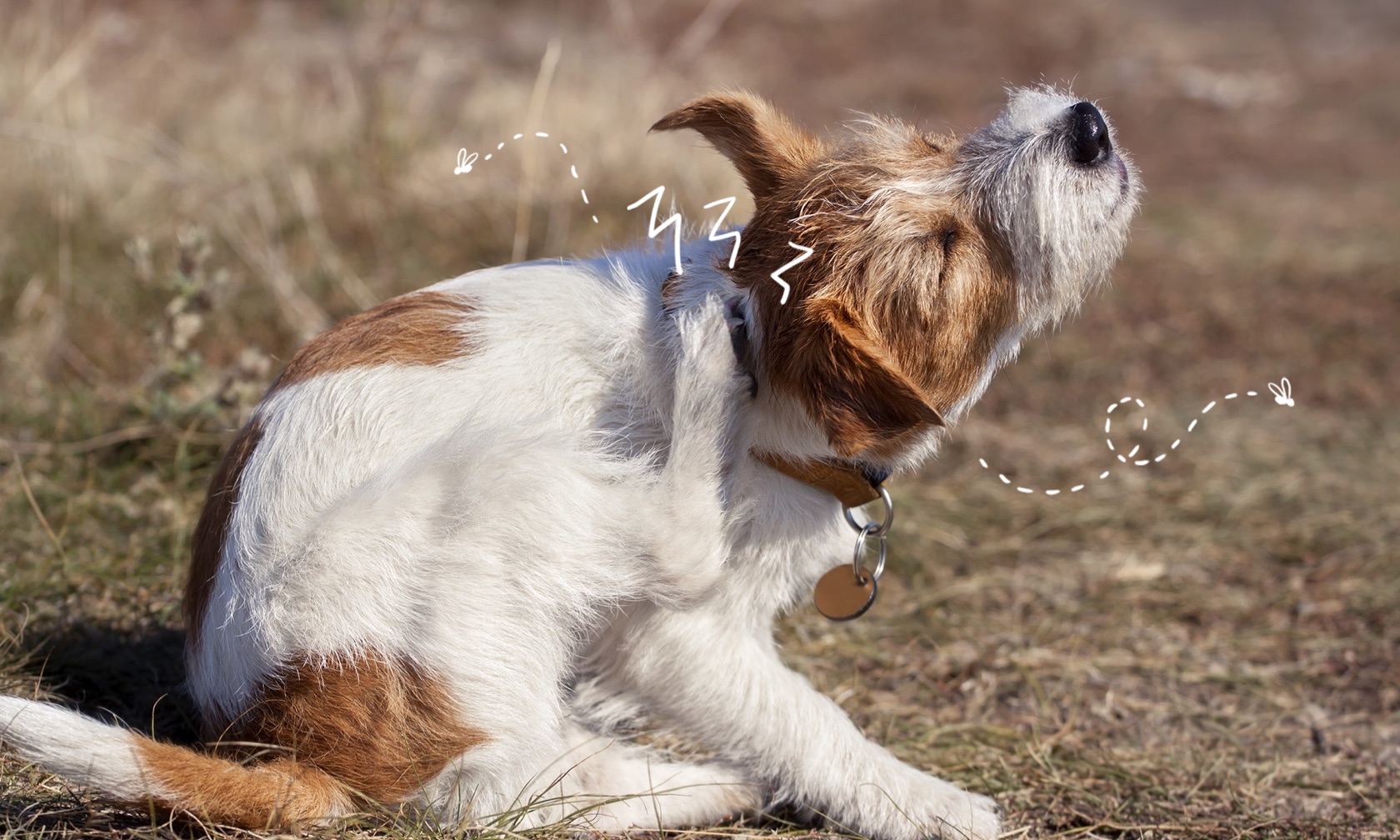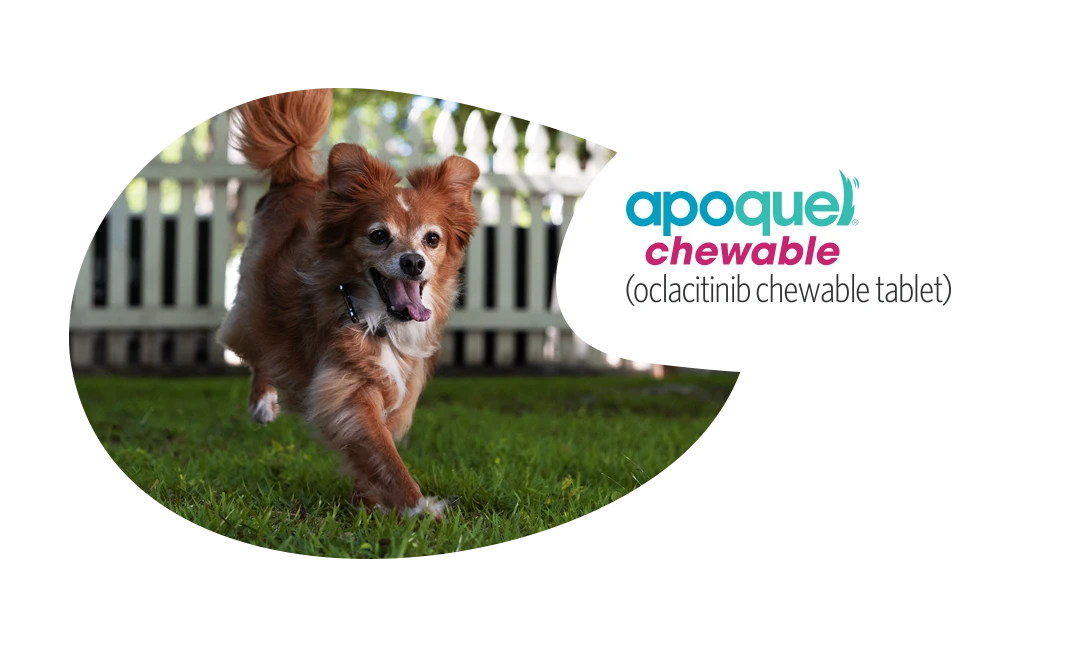Your dog’s day might look something like this: wake up, go to the bathroom, eat and drink, scratch an itch, play with a toy, nap, and repeat! But if their routine includes a lot more scratching, there could be a reason for the itch.
While an occasional itch is a common occurrence for dogs, frequent scratching — along with things like scooting, excessive chewing or biting, or redness of the skin — are signs of skin conditions that may need medical treatment. Not only is itching an annoyance for dogs, but it can also be painful for them and lead to additional medical problems if left untreated.
Some Common Reasons Your Dog Might Be Itching:
- Fleas
Not only do fleas cause intense itchiness in dogs, but some dogs have an allergy to flea bites and saliva, which can cause: severely inflamed and itchy skin, hair loss, scabs, and discomfort. Protect your dog from fleas by ensuring they’re on an effective flea control medication year-round. - Environmental Allergy
Your dog may be allergic to pollen, dust mites, mold spores, grasses, and a whole host of other common environmental allergens. You might see your dog licking their paws, rubbing their face, or shaking their head after time outside. Your dog also may show increased scratching or rubbing behaviors, along with hair loss on their legs, sides, and belly. The inner ear flaps and outer ear canals can look red and irritated, and there may be a brownish ear discharge. - Food Allergy
When your dog is allergic to their food (which includes their main diet and any treats you give them), they may show this allergic reaction by scooting, licking their rear end, or itching multiple areas on their body — like the face, ears, belly, armpits, and paws. Ear irritation and infections are common with food allergies, too. Some affected dogs may also have digestive issues, like gas, increased number of bowel movements, or loose stools. Food allergies in dogs are typically a result of the protein(s) in their food or treats1, not the grains — so going “grain-free” often does not help relieve their itch.
- Hot Spots
These raw, inflamed areas often develop due to allergies or fleas. They can also happen after bathing or swimming, especially if the affected area wasn’t properly dried. Constant scratching or chewing can cause an imbalance in the bacterial levels on their skin, leading to secondary bacterial skin infections. These skin infections can show up as open sores, red bumps, pimples, scabs, and oozing discharge. Yeast Infections
When a dog has a yeast infection, their skin is often greasy, red, or thickened (“elephant skin”), and has an odor. Folded areas in the ears, on the face, neck, armpits, groin and under the tail are most commonly affected. Yeast infections most often are secondary to allergies, and they are extremely itchy and uncomfortable for your dog.Bacterial Skin Infections
These usually occur when your dog has already been scratching an area to the point of inflammation and skin damage, inviting bacteria to multiply and cause an infection. Signs of a skin infection include persistent itching, skin redness, crusts/scabs, rash, or pimples. Most bacterial skin infections in dogs are secondary to allergies or parasites, but they can also occur in dogs with hormonal imbalances.
If you see any signs of the above conditions, make an appointment to see your dog’s veterinarian. They will work to relieve your dog's itchiness quickly, find what's making your dog itchy, and determine the best treatment for your pet and your lifestyle. Their veterinarian will create the most effective treatment plan for your dog plus give you other tips, so you and your dog get the relief you deserve.
ZPC-00305R2
IMPORTANT SAFETY INFORMATION: See full Prescribing Information. Do not use Apoquel or Apoquel Chewable in dogs less than 12 months of age or those with serious infections. Apoquel and Apoquel Chewable may increase the chances of developing serious infections, and may cause existing parasitic skin infestations or pre-existing cancers to get worse. Consider the risks and benefits of treatment in dogs with a history of recurrence of these conditions. New neoplastic conditions (benign and malignant) were observed in clinical studies and post-approval. Apoquel and Apoquel Chewable have not been tested in dogs receiving some medications including some commonly used to treat skin conditions such as corticosteroids and cyclosporines. Do not use in breeding, pregnant, or lactating dogs. Most common side effects are vomiting and diarrhea. Apoquel and Apoquel Chewable have been used safely with many common medications including parasiticides, antibiotics and vaccines.
INDICATIONS: Control of pruritus (itching) associated with allergic dermatitis and control of atopic dermatitis in dogs at least 12 months of age.
- Mueller R, Olivry T, Prélaud P. Critically appraised topic on adverse food reactions of companion animals (2): common food allergen sources in dogs and cats. BMC Veterinary Research [serial online]. 2016;12(9):(12 January 2016). doi:10.1186/s12917-016-0633-8





